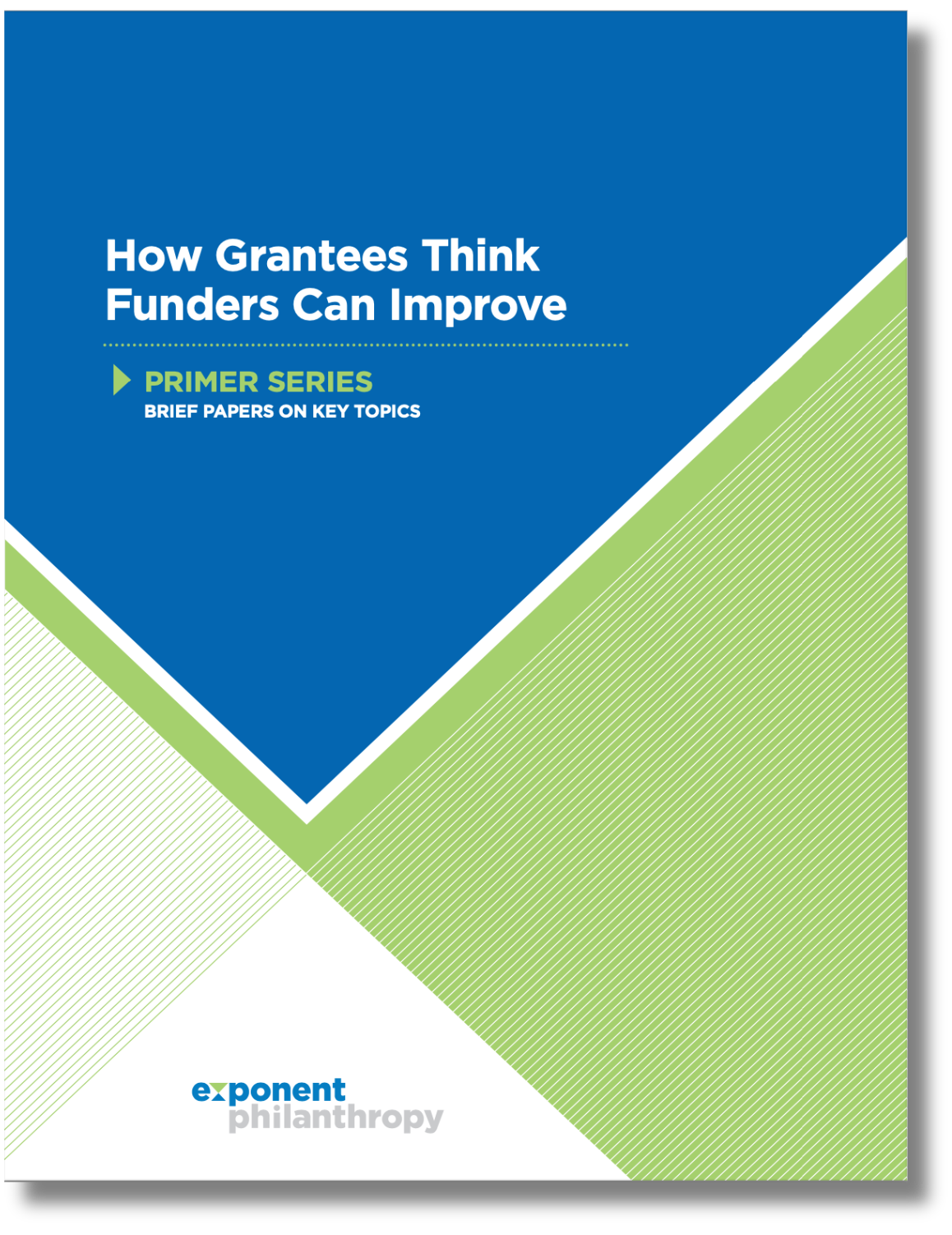
Funders and grantees share a relationship that goes beyond just financial support—it’s built on mutual respect, trust, and collaboration to create meaningful change. One powerful but often overlooked way funders can strengthen this relationship is by actively championing their grantee partners.
Feedback from our Grantee and Applicant Perception Surveys (GAPS) shows that grantees want funders to take a more active role in promoting their work and successes. Here’s what some had to say:
- “Good communications work is extremely expensive. We deeply appreciate promotion of our successes.”
- “Does the foundation have a newsletter or other communication avenues where it can highlight our work?”
- “Stories of impact from grantees and partners would be a great way to increase credibility and make efforts more visible.”
Let’s dive into why championing matters, how it amplifies success stories, and the ways it can boost the collective impact of your philanthropic work.
The Benefits of Championing Grantees
Foundations have a variety of ways to showcase their grantees and their work without significant extra cost. Our members have highlighted some key benefits of doing so:
Attracting Additional Funding
Foundations pay attention to what their peers support. And lean foundations are known for making bets on new and creative ideas – to be first-in. The new projects, pilot initiatives, and emerging fields that lean funders support can catch the attention of larger foundations.
Increasing Grantee Visibility
Public figures like elected officials, journalists, and leaders in your field look to foundations to learn about impactful nonprofit work. By highlighting your grantees, you can introduce them to these key audiences, potentially opening doors for collaboration and support.
“Not many foundations focus like we do on funding civil legal services. So, we’re trying to make other potential partners aware of what we do and why we do it, to encourage people to get in touch with us with field-specific ideas, innovations, and partnerships.”
— Akilah Browne, FurtherJustice (New York, NY)
Expanding Networks and Building Collaboration
Spotlighting your grantees can attract other organizations working in similar areas, leading to new connections and collaborations. These connections can help identify potential grantees, coalition members, or other valuable partners.
“Our communications strategy aims to create connections among folks who may have familiarity with each other but haven’t connected yet, and those who have never heard of nor met each other before. For instance, two partners in a grant program knew each other through our quarterly learning community gatherings. However, they connected one-on-one after they attended a webinar and read a follow-up newsletter interview featuring one partner’s work. It was such a fruitful and synergistic point of connection for both organizations, that a team member from one actually joined the other’s advisory committee.”
— Megan Cook, Rx Foundation (Hadley, MA)
How To Champion Grantees
Here are practical ways to support and promote your grantees:
List Grantees on Your Website
Many foundations have websites that include their mission statement and grant guidelines. This is an excellent place to feature your grantees. For instance, several foundations in the Exponent Philanthropy community provide dedicated space for grantees, for example:
- The Tzedek Social Justice Fund
- Esther A. & Joseph Klingenstein Fund (New York, NY) Early Childhood Grantees
- FurtherJustice (New York, NY) Legal Accelerator Grantees
- The REAM Foundation (Buffalo Grove, IL) Selected Grants
Share Grantee News and Events
Use your website, social media, and other channels to share news and events from your grantees. For example, the Cullen Foundation in Buffalo, NY, promotes arts events by its grantees, such as outdoor concerts and festivals.
- Cedar Tree Foundation (Boston, MA) Grantee Stories
- Cullen Foundation (Buffalo, NY) Cullen Grantees Are Hiring!
- Rx Foundation (Hadley, MA) Partner Updates
Write About Your Partners and Host Webinars
Funders who are supporting new and emerging fields or movements write about a cohort of grantees doing innovative work to help the public learn about the field or approach and build interest among potential collaborators and stakeholders. Foundations that support individuals such as researchers, activists, artists, and social entrepreneurs also use these strategies to highlight work they believe in. To manage this work, some funders choose one grantee each month to highlight. Here are examples:
- Ball Brothers Foundation (Muncie, IN) Grantee Spotlights
- FurtherJustice (New York, NY) Announces $1.2 Million to Inaugural Cohort of Legal Accelerator Grantees
- Rx Foundation (Hadley, MA) Webinars
- Robert and Patricia Switzer Foundation (Belfast, ME) Fellow Stories
Publish a Newsletter
Lean funders often use newsletters to feature their grantees’ stories. If you don’t yet have a list, start small and build gradually by inviting board members, grantees, and other stakeholders to subscribe. Make it easy to sign up on your website.
- Robert and Patricia Switzer Foundation (Belfast, ME) June Newsletter
- Rx Foundation (Hadley, MA) Email Campaign Archive
How to Build a Newsletter Distribution List
Building a newsletter list takes time, so start small and grow it gradually. Here are some simple steps:
-
Invite Key Contacts First: Start by inviting board members, committee members, grantees, advisors, and consultants to join your newsletter. Encourage them to invite their contacts too.
-
Add Meeting Contacts: After each meeting with stakeholders—like funders, colleagues in your field, or government staff—ask if you can add them to your list. If they agree, sign them up directly to make it easy for them.
-
Make Signup Easy on Your Website: Add a clear sign-up option on your homepage and wherever you describe your mission and grant guidelines. Make sure people know how they can unsubscribe if needed.
This gradual approach will help you build a strong, engaged audience over time.
 How Grantees Think Funders Can Improve
How Grantees Think Funders Can Improve
Funders want to be the best versions of themselves. A critical step on that journey is getting feedback from grantees. Over the past two years, we’ve surveyed more than 400 nonprofits to learn what lean funders do well and where they can improve. Get your free copy now »
About the Author
Andy Carroll advises staff, trustees, and donors of leanly staffed foundations in leadership, advocacy, and catalytic philanthropy. He works to empower more leanly-staffed foundations to leverage their unique position and assets to catalyze change on important issues. Andy has an MBA from the University of Michigan Business School and 30 years of experience in management, training, and program development for nonprofit organizations. Follow him on Twitter @andycarrollexpo, and check out his Catalytic Philanthropy Podcast.
Hannah Smith manages editorial content and publications at Exponent Philanthropy.
